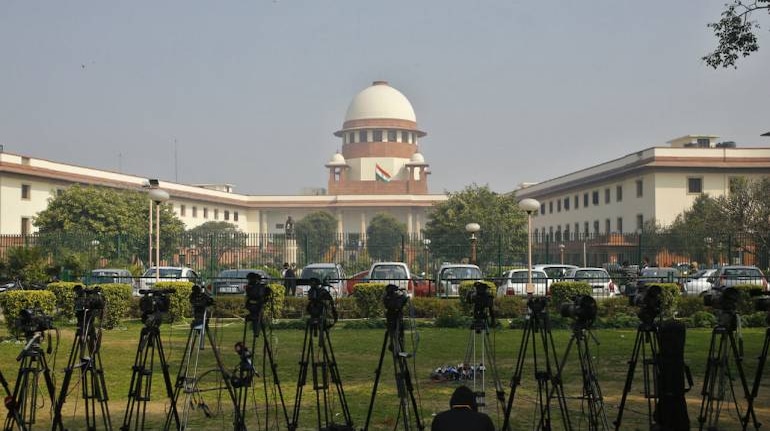



The review petition affords the Supreme Court yet another chance to secure both justice and closure in the Ayodhya case. It is a test of the adherence to the rule of law of pro-temple groups. The Supreme Court’s November 9 verdict was received maturely by all parties, particularly the Muslims who have recourse to a review. Under Article 137 of the Constitution seeking a review of a Supreme Court verdict is the right of an aggrieved party and is entirely legal.
Since the court’s verdict was read out in the Ram Janambhoomi- Babri Masjid case, there has been speculation that at least a few parties would file for review of the 5-0 judgment in favour of the temple. Besides the Muslims, the Nirmohi Akhara, too was expected to file a review as their suit was dismissed on grounds of limitation; however, so far the Akhara has not made any moves to suggest it is serious about challenging the verdict. The All India Muslim Personal Law Board (AIMPLB) has said that it will file its own review petition before December 9.
The first review petitioner in the case is Jamiat Ulama-i-Hind, legal heir of M Siddiq, who was one of the nine locals from Ayodhya who first filed the suit along with the Sunni Waqf Board in 1961. The petition doesn’t reject the verdict in toto; in fact, it accepts several findings of the judgment such as, “the Deity is not a perpetual minor for the purposes of limitation”, the “Vishnu Hari Inscriptions were not recovered from the disputed site”, that “courts cannot correct historical wrongs” and that there was “no evidence that the pre-existing structure was demolished to construct the Babri mosque”.
The verdict to allow the construction of the temple while awarding a 5-acre plot to Muslims elsewhere in Ayodhya to build a mosque has been criticised for leaning heavily in favour of the Hindu parties. It has to be borne in mind that the review petition essentially articulates and expresses this dissatisfaction, and not through protests or rallies, but in the permissible forum i.e the Supreme Court of India.
Since the verdict has been announced peace has been made to prevail with the aid of a massive security blanket all over communally-sensitive areas across India, especially in Uttar Pradesh. In Ayodhya’s quiet neighbourhoods, the verdict was received by both Hindus and Muslims with a sense of relief pegged to the belief that now that the temple has been decreed, the dispute would be over.
The verdict has already been referred to in the ongoing Jharkhand elections by BJP President Amit Shah who attacked the Congress for stalling the case and being an obstacle in the way of the temple. This review petition is not an obstacle, it’s a legal remedy allowed by the Constitution and the Muslim parties are using it to record their deep disappointment at the verdict.
In the Sabarimala case, the Hindu parties’ review petition on grounds of ‘centuries-old beliefs’ and ‘internal matters of faith’ has been referred to a larger bench. In the Ayodhya case, the grounds are starker and precise, and to label it as an obstacle, serves only the cause of Right-wing majoritarianism.
The petition rightly contends that the apex court has erred in directing the construction of the temple, especially after it held the forcible implantation of the Ram idol in 1949 and the destruction of the Babri mosque in 1992 patently illegal. This has ramifications that are universal and undeniably horrendous.
Although the verdict’s commendation of the Places of Worship Act 1991, under which the status of a place of worship is settled basis as it was on August 15, 1947, is a relief, there is no guarantee that tomorrow monuments of shared national heritage such as the Taj Mahal could be targeted in a similar manner. The temples at Mathura and Varanasi have remained on the list of Right-wing groups and even in the wake of the verdict no assurances regarding letting go of their demands have been forthcoming.
More than demanding the reconstruction of the Babri mosque, the petition also underscores the threat that this verdict could become a justification for Ayodhya-like campaigns all over the country.
The review is widely expected to be a futile exercise as the judgment was unanimous and one of the judges, SA Bobde, is now the Chief Justice of India. However, while considering the review petitions, the court must bear both pragmatism, prudence and constitutional foresight in mind, and remember the words of Chief Justice of India, Ranjan Gogoi while allowing the Sabarimala review: “Fresh opportunities to be given to all parties.”
Valay Singh is a freelance journalist. Views expressed personal.
Discover the latest Business News, Sensex, and Nifty updates. Obtain Personal Finance insights, tax queries, and expert opinions on Moneycontrol or download the Moneycontrol App to stay updated!
Find the best of Al News in one place, specially curated for you every weekend.
Stay on top of the latest tech trends and biggest startup news.